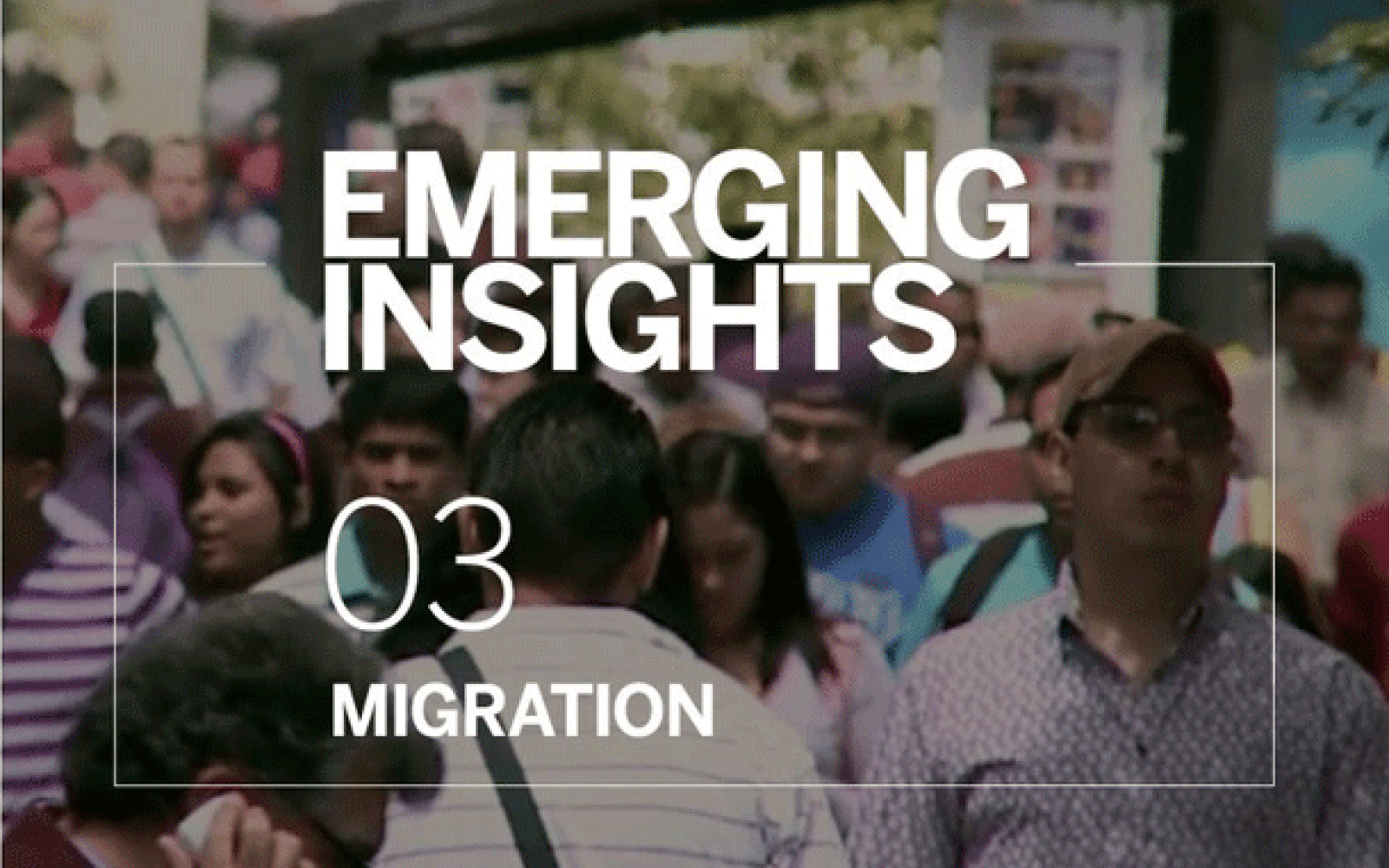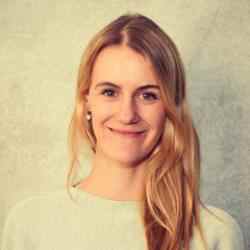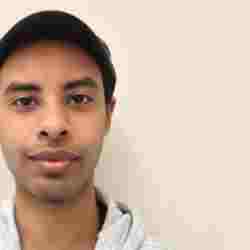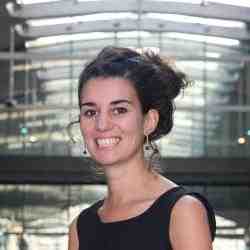Global Issues
285 million (3.4% of the world population) international migrants were counted globally in 2017. Only 25.4 million were registered as refugees, indicating that many are on the move voluntarily for personal, economic, or political reasons.[1] Most migration involves people moving from neighboring countries or countries in the same part of the world. Most people move for economic reasons. Almost two-thirds of migrants now reside in developed countries where they fill a labor deficit.[2]
In 2018, some countries strained under the persistence of permanent migration, struggling to identify solutions when individuals cannot repatriate. In East and Central Africa, decades of continued conflict in the Democratic Republic of Congo, South Sudan, and Somalia have pushed governments to come up with solutions for the integration and settlement of refugees who have been living long-term in camps. Perhaps the most heartbreaking story this year involved the forced migration of Rohingya Muslims from Myanmar to Bangladesh, a country ill-equipped to house them. And despite the overwhelming data showing that migrants improve economies, we have seen escalating tensions between developed countries and immigrants looking to settle in Europe and the United States.[3] Solutions for human migration that are more organized and humane will necessarily involve deeper understandings of the intersectional push and pull factors that compel people to move.
New Ideas
Whether migrants are pushed or pulled, many of our Fellows in 2018 are working to identify ways to enable them to have greater decision making in their lives. One of the common insights we have had in working with Fellows focused on migration, is that creating positive change fundamentally involves ensuring they can find meaningful livelihoods and economic autonomy. In this year’s cohort of Fellows, we see two models of economic integration. Our insights have also shown us that including migrants into the economy has to be accompanied with a recognition of their potential contributions and three of our newest Fellows are developing initiatives that fully value the role of immigrant leadership and community building.
Matchmaking for economic autonomy
Growing up in Germany, Zarah Bruhn lived a sheltered life until a big influx of refugees landed in the country and she felt compelled to give back. She began by organizing welcoming initiatives but quickly realized the most urgent need was in finding low-barrier entry to employment. Her solution was a temporary employment agency model call Social Bee. She recruits and hires refugees, takes full employer responsibility, and eventually places employees in jobs. She requires that each sub-contract last for a minimum of one year so that employees have a real opportunity to gain legitimate experiences which could then lead to a permanent hire or placement in another work opportunity. Social Bee acts as an interpreter for both refugees and the companies who hire them – helping refugees to understand German work culture and enabling companies to more deeply understand the complex life situation of refugees. Zarah’s initiative bridges cultural and structural divides.
The economic inequality between EU and non-EU citizens in Belgium is also grim, in spite of the fact that 18% of the population is currently comprised of immigrants from outside of Europe.[5] In some locations predominantly inhabited by non-Europeans, there can be unemployment rates as high as 30%. There are numerous signs of polarization between European and non-Europeans with racism, Islamophobia, and populism on the rise.[6] In response, co-founders Matthieu Le Grelle and Frédéric Simonart developed DUO for a JOB to create new economic opportunities for immigrants, while simultaneously enabling Belgian retirees to serve as mentors. They create linkages between people with skills, connections, and networks in Belgium and the refugees and immigrants who need help to understand how to market themselves for the Belgium job market. The result is that newcomers have the opportunity to learn from experienced locals who are hungry to offer their talent and resources.
Harnessing human potential for urban integration
In Portugal, Hugo Menino Aguiar is also working to bridge the cultural gap between diverse groups. He designed SPEAK, a technology platform that enables refugees and immigrants to become Buddies, or informal facilitators and teachers, within a network of people interested in cultural exchange. SPEAK also has Ambassadors, who work to build offline communities in 10 cities in Portugal, Spain, Italy, and Germany. Through linguistic and cultural exchange, Hugo is weaving together people from diverse backgrounds and showcasing that integration does not happen linearly. Over 5,000 people have participated in events created by the SPEAK network, and over 6,000 have participated in language learning. More than 50% of participants are people who have recently migrated to Europe.
The Opportunity: New tools for a world on the move
How do we prepare to integrate and enable migrants to be powerful worldwide?
Whether seeking opportunity or fleeing from war, political instability, and climate change effects, more and more people are on the move. This has far-reaching consequences on both the place one comes from and where one ends up. Migrants’ identities and relationships to country and community shifts; economic, social and political uncertainty reigns. More solutions are needed to mitigate the trauma of displacement and create positive opportunities for both those on the move and the communities they touch.
Ashoka’s expansive global network enables us to solve global level issues like migration by bringing together and scaling the best ideas with governments, multilateral institutions, private sector companies, and other citizen sector organizations. In 2016, we began to connect key European partners as part of our Hello Europe initiative. Ashoka and key European partners (including Zalando, Robert Bosch Foundation, and the Schöpflin Foundation) invested more than €1 million to source, scale, and transfer innovative solutions in four European countries.[8] Our attention is now being turned to the whole of Europe and beyond. Ashoka recognizes that with our expansive global network, we have the knowledge tools and resources to help get the best solutions to the right people.
[1] International Organization for Migration (2018) Global Migration Indicators
[2] Woetzel, J., Madgavkar, A., Rifai, K., Mattern, F., Bughin, J., Manyika, J., and Hasyagar, A. (2016, November). Global migration's impact and opportunity. Retrieved from
[3] Passel, J.S. and D’Vera Cohn. (2017) “Immigration Projected to Drive growth in U.S. Working-age Population Through at Least 2035” Pew Research Center. Retrieved from http://www.pewresearch.org/fact-tank/2017/03/08/immigration-projected-to-drive-growth-in-u-s-working-age-population-through-at-least-2035/
[4] Romei, V, Ehrenberg-Shannon, B., Maier-Borst, and G. Chazan (2017) “How well have Germany’s refugees integrated?” Financial Times. Retrieved from https://www.ft.com/content/e1c069e0-872f-11e7-bf50-e1c239b45787
[5] Petrovic, M. (2012) Belgium: A Country of Permanent Immigration. Migration Policy Institute. Retrieved from https://www.migrationpolicy.org/article/belgium-country-permanent-immigration
[6] Bayrakli , E and F. Hafez (2017) European Islamophobia Report. Seta | Foundation For Political, Economic And Social Research.
[7] Park, H. (2017, October 10). The Power of Cities. UNHCR. Retrieved from https://www.unhcr.org/innovation/the-power-of-cities/
[8] Learn more about Hello Europe at: http://www.hello-europe.eu/



